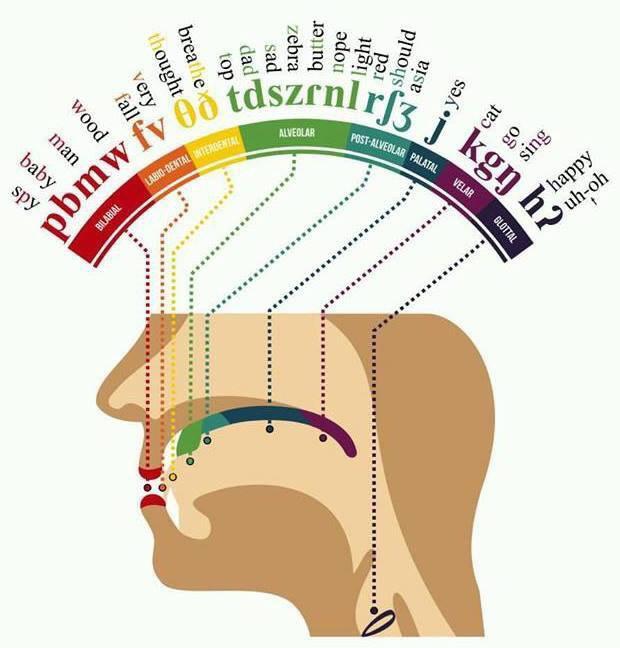TL;DR: Does your voice change when you switch languages? You're not alone. Learning a new language forces you to account for differences in etiquette, produce unfamiliar sounds, and even question your confidence. All these factors can affect your voice!
I grew up in a bicultural home, where switching from Spanish to English was a matter of crossing from the kitchen into my mother’s studio. By most accounts, I have a native-like accent in both languages, and I rarely find myself not knowing a word in either.
Two weeks ago, while hanging out with my English-speaking coworkers, I played a quick voice note that I’d sent to some friends back in Peru.
“That’s not really you, is it? You sound so much younger!”
That was me alright, with the same tendency to smack my lips during awkward pauses and to switch speeds at random in the middle of a sentence. Yet, my pitch was higher and my inflection flatter, making me sound slightly girlier. It was me, but at the same time, it was not.
A quick Google search showed that this is not an uncommon phenomenon at all. If you have noticed it happening to you, it’s not just because you have been taking our advice and reciting the catchphrase of your favorite foreign TV character.
You’re not imagining and that friend of yours who can speak French is not simply putting on airs. There are several ways in which switching languages can change our voices.

Key Takeaways
- Voice changes in foreign languages are influenced by both physiological and psychological factors
- Cultural accommodation plays a significant role in how we express ourselves in different languages
- Recent studies show that language switching can affect vocal cord strain and pitch modulation
- Understanding these changes can improve language learning outcomes and prevent vocal strain
- Can You Learn Multiple Languages At Once?
- 8 Best Chrome Extensions for Language Learning
- Best Language Learning Programs for 2025: Tools That Get Results
Why does my voice sound different in other languages?
Your voice sounds different in other languages due to both physical and psychological changes that occur when switching languages. This difference manifests in four key ways:
- Personality Shifts: Many speakers report feeling like they're "adopting a different persona" when speaking another language
- Voice Changes: Your pitch, tone, and volume often naturally adjust to match the new language's patterns
- Physical Adjustments: Your mouth, throat, and breathing patterns change to produce unfamiliar sounds
- Cultural Adaptation: You unconsciously modify your speaking style to match cultural norms
These changes aren't just in your imagination – they're supported by research and reflect your brain's remarkable ability to adapt to different language systems.
Part 1 – Is It Just Politeness?
The way we modulate our voices is deeply entwined with many different social codes. When we are communicating in a foreign language, we always tap into these mannerisms to convey our meaning.
A lot of this comes down to the way certain languages work differently from your native language. For example, some languages are tonal, where the way you stress some syllables can change the meaning of certain words.
Is our new language changing us?
However, switching languages can also change the way we think about what we are about to say. For example, German and Spanish both have a special verb conjugation for people we are not very familiar with. English doesn’t, so it lets you keep the same air of familiarity with everyone.

Because of this, when a native English speaker switches to German, they may become suddenly more aware of this social distance. It’s not hard to jump from that to feeling suddenly more intimidated by strangers.
Cultural accommodation
The act of adjusting our etiquette, and even our personalities, to a changing social context, is known as cultural accommodation. For people who grow up both bilingual and bicultural, there seems to be an unconscious adjustment triggered by the act of switching languages.
Back in 2010, a study tried to quantify the effects of this accommodation. They took a group of bilingual and bicultural Hong Kongese (who could speak both Cantonese and English fluently, and who had lived in both Hong Kong and the UK), had them fill out personality tests in both Cantonese and English, and then conducted interviews with both Hong Kongese and English researchers.
They expected to see them express more “Western” values, such as extraversion or individuality while talking to English interviewers. However, they were surprised to see that these differences persisted in the written test.
What’s more, when asked to describe themselves (whether during the interview or in writing) the subjects consistently chose to highlight different adjectives.
Split personalities?
Those of us who grew up as third-culture kids are often left feeling like we have two very different personas. With one foot on each side of the river, it would be impossible to decide which one is really us.
In my case, this is further confounded by having two names. My legal name is very Spanish, and very hard to pronounce or spell for English speakers. Because of this, I often use my middle name (Alfie) in my Anglo-Caribbean life.
Ximena and Alfie are both me, but Ximena definitely uses “please” a lot less, is quite more direct, and prefers to drink wine. Alfie is better at queueing, uses more medical terminology, and is fonder of rum on the rocks. They’re both me, and I like both rum and wine.

So far, these differences are mostly cultural and seem confined to those of us who are either fully bilingual or who have lived abroad for most of our lives.
However, there is a much more widespread (and puzzling) counterpart to that: the way that the physical aspects of our voices also change. This process starts long before we become fully fluent.
Part 2 – Why Do You Sound Like Your Younger Sister?
As soon as we cross the barrier into “conversational”, many of us drop a couple of registers, keep our volume low, and unconsciously begin straining our voices. Here’s why:
You sound different because you’re making different sounds
Up to a certain point, some of the adjustments we have to make to our voices are deliberate, and they just help us make foreign sounds better.
French is a good example of this: a lot of its sounds are made at the front of the mouth. If you are a German native speaker, you are probably more used to producing noise at the back of your mouth, so switching to French will automatically make your register higher and softer.
At the same time, we need to account for the fact that some languages will pronounce the same letter slightly differently. For example, when Spanish speakers say “pa”, they often sound a lot like an English speaker saying “ba.”

If you are constantly having to account for this when you switch a language, it may drive you to be hyperaware of the way each sound and vowel vibrates within your mouth – making you sound more deliberate or reserved. At the same time, it may make your listeners judge your speech differently.
This pretty interesting study from 2013 tested this. The researchers found that you could play a voice clip with the same syllable to a group of bilingual people, and they would transcribe it differently depending on whether they were told the person in the clip was a Spanish speaker or an English speaker.
Confidence
Using a foreign language can also affect your confidence slightly, which may make you unconsciously alter your pitch and volume.
On this video, Hadar Shemesh offers a beautiful explanation about how fear and anxiety can make your voice “carry” less around a room.
Is this bad?
In the short term – no. Granted, if you are often feeling anxious about your accent, you may be turned off from language learning altogether.
That being said, it’s perfectly natural to go through a weird stage when trying to learn a new language. The process has several plateaus, and for the most part, being able to notice your own pronunciation errors is overall a sign of progress.
There’s a downside to constantly using an “unnatural” voice when you speak. If you are constantly speaking outside your natural register, you could be slowly straining your vocal cords.
According to this 2017 study, the physical effects of straining your voice when switching between languages are very real and could create tissue damage later in life.
Why Do Languages Sound Different?
Languages sound different because they each use a unique combination of speech sounds and patterns. These differences stem from three main factors:
1. Manner of Articulation
Each language requires specific positioning of your speech organs:
- Tongue placement (front, middle, or back of mouth)
- Lip shape (rounded, spread, or neutral)
- Air flow control (through mouth or nose)
- Vocal cord vibration patterns
Native speakers produce these movements automatically, while language learners must consciously adjust their speech organs to create unfamiliar sounds.
2. Sound Inventory
Languages differ in their basic sound building blocks:
- English has about 44 distinct sounds
- Japanese uses only 25 sounds
- Arabic includes sounds made deep in the throat
- Mandarin Chinese uses tones to change word meanings
- Some languages use clicks (like Xhosa)
3. Rhythm and Melody
Languages have unique musical qualities:
- Stress patterns (which syllables are emphasized)
- Intonation (rising and falling pitch)
- Timing (how sounds flow together)
- Pausing patterns between words and phrases
These differences explain why Japanese might sound "choppy" to English speakers, or why French appears to "flow" differently than German. Your brain recognizes these patterns even before understanding the words, which is why you can often identify a language without speaking it.
Embracing Your Multilingual Voice
Understanding why your voice sounds different in foreign languages is just the first step in your language-learning journey. The key to actually developing natural speech in a new language lies in consistent exposure to native speakers and authentic content. This is where Lingopie's features can help! By watching thousands of hours of native content with interactive subtitles, you can:
- Observe how native speakers naturally modulate their voices
- Pick up authentic pronunciation patterns
- Understand the cultural context behind language use
- Practice speaking in a low-pressure environment
Start your language learning journey with Lingopie's free trial and discover how natural your voice can sound in a new language. Remember, every great speaker started exactly where you are – the only difference is they took that first step.
Frequently Asked Questions About Language Sounds
Why do I have an accent when I speak another language?
You have an accent when speaking another language because your brain and speech muscles are conditioned to produce sounds from your native language. When learning a new language through platforms like Lingopie, you're essentially training your speech organs to make unfamiliar movements and sound combinations. Your accent reflects the influence of your native language's sound patterns on the new language, similar to how a pianist might need time to adjust to a different keyboard layout.
With consistent practice and exposure to native speakers through authentic content, your accent can become more native-like as your brain creates new neural pathways for these sound patterns.
Why does my voice sound different in other languages?
Your voice sounds different in other languages because speaking a new language requires different muscle movements, breathing patterns, and cultural expressions. Research shows that languages activate distinct areas of your brain, leading to changes in pitch, tone, and even personality. When watching foreign content on Lingopie, you might notice how native speakers use different parts of their mouth or throat to create sounds that don't exist in your language. These physical adjustments, combined with cultural factors like formality levels and emotional expression, create what feels like a different voice when switching languages.
Why do people sound different in different countries?
People sound different in different countries because each language evolved with its own unique sound system, shaped by cultural, historical, and environmental factors. Every language has a distinctive combination of consonants, vowels, rhythm patterns, and intonation that native speakers learn from birth.
For example, tonal languages like Mandarin use pitch changes to convey meaning, while stress-timed languages like English rely on emphasized syllables. These differences are so fundamental that even babies can distinguish between languages before they can speak. Through immersive learning with authentic content, as provided by Lingopie's native-speaker shows and movies, learners can better understand and reproduce these unique sound patterns.






![5 Official Spanish Language Tests To Show Your Proficiency Level [Guide]](/blog/content/images/size/w300/2025/06/Spanish-Language-Tests.jpg)
![Why Memorizing Spanish Words Won’t Make You Fluent [Tips]](/blog/content/images/size/w300/2025/06/how-to-practice-spanish-vocabulary.jpg)
![How to Improve Your Polish Conversation Skills [5 Best Tips]](/blog/content/images/size/w300/2025/06/improve-polish-conversation-skills.jpg)
